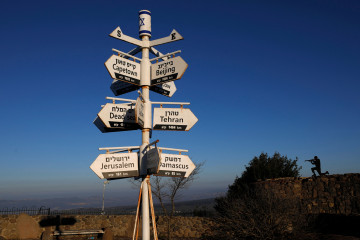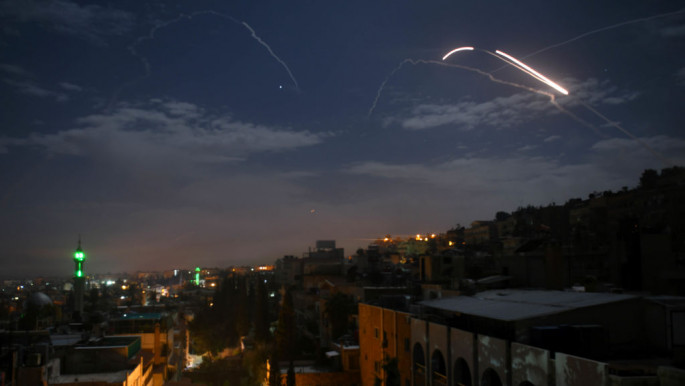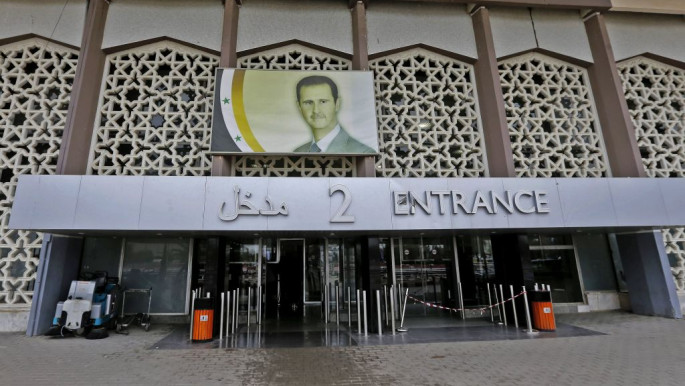

Following the November 2022 parliamentary elections in Israel, the country’s controversial and long-serving former prime minister, Benjamin Netanyahu, is once again preparing to form a government.
To Israel’s north, the centre of power in Damascus remains concentrated in the Baathist regime of Bashar al-Assad.
After twenty-two years of authoritarian rule, Assad’s government remains greatly weakened and is unable to stop the torrent of Israeli military airstrikes that have occurred over the years of grinding warfare in Syria.
The incoming hardline Israeli government’s approach to its troubled northern neighbour comes at a time of new risks and opportunities.
"Israeli strikes on Syria have only grown more frequent in volume as time has passed by, given the current trajectory of events, this seems unlikely to change"
Power politics amid a proxy war
Allied with an array of far-right Zionist parties, Netanyahu looks set to stack the ministries with his ultra-nationalist political partners, including Otzma Yehudit (Jewish Power) leader Itamar Ben-Gvir and Religious Zionist Party leader Bezalel Smotrich, who was once described by a Shin Bet official as a “Jewish terrorist”.
However, Netanyahu will likely keep the defence minister posting reserved for his Likud Party, and task Yoav Galant, a Likud MK, to the role, as the United States and other Arab countries are closely watching the cabinet formation process.
Since 2013, Israel has launched cross-border attacks against the Syrian regime, Iranian-backed militias, and Hezbollah forces operating in Syria. These attacks unfold in the background as part of a shadow war between Israel and Iran, in which Netanyahu himself is a veteran player.
“Israel follows a policy of not claiming responsibility for airstrikes in order to allow its targets to save face. The number of Israeli airstrikes on Syria will likely stay the same,” Ruwan Al Rejoleh, a Middle East Analyst based in DC, told The New Arab.
The prospect of a far-right government in Israel could signal that the Israelis could soon escalate their policy of conducting attacks against the Iranian elements active in supporting the Assad regime’s campaign to regain total control over the country.
“It doesn't matter which government is in power in Israel. Syria for Tel Aviv is a matter of national security because of its connectivity with Iran and Hezbollah,” Rejoleh said.
The Israeli bombing raids in Syria in recent months have become more pronounced and brazen. Targets include civilian infrastructure, such as the Damascus airport in June 2022 and the Aleppo airport in September 2022. The damage caused to the runways disrupted civilian passenger flights, which worsens Syria’s heavily sanctioned economy and overall sense of international isolation.
|
|
In mid-November, Israel reportedly struck the Assad regime’s Shayrat airbase in Homs province, killing two Syrian soldiers.
“Israeli strikes on Syria have only grown more frequent in volume as time has passed by, given the current trajectory of events, this seems unlikely to change,” Danny Makki, a Non-Resident Scholar with the Middle East Institute, told The New Arab.
In early November, an attack took place on an Iranian-backed militia convoy transporting fuel at the Qaim border crossing with Iraq, which reportedly killed Iranian personnel.
“The nature of those strikes is highly predatory and it seems any excuse or event in the region can trigger a strike which is pre-planned and often the targets are chosen in advance or monitored on a rolling basis,” Makki said.
"Netanyahu could seek to intensify the airstrikes against Iranian-supported militias in Syria at a time when Russia is struggling in Ukraine"
The Iran-Lebanon factor
However, with the recent signing of a maritime agreement between Israel and Lebanon, the prospect of more regional countries engaging in economic and diplomatic cooperation with Israel has once again presented itself, even indirectly extending to Iran.
As Al-Monitor recently noted, approval of the Israeli-Lebanese deal by Tehran did not occur by “accident or oversight,” which is an indication that Iran’s silent approval means the regime wishes to see a restart of the JCPOA negotiations with the United States.
“The new factor for Netanyahu is the maritime agreement between Lebanon and Israel, which indirectly involves Hezbollah. It's likely that Bibi has a new reality to deal with when it comes to Russia in terms of influence points such as Ukraine, Syria, and the protests in Iran. The latter events created a pause in the talks of pursuing a new JCPOA agreement,” Rejoleh added.
“This will give Israel a margin to manoeuvre and pressure Iran to minimize its military capabilities in Syria,” she noted.
The Biden Administration is weighing whether (or when) to resume talks with Tehran as the Mahsa Amini protests continue in Iran, despite a brutal regime crackdown.
Netanyahu could seek to intensify the airstrikes against Iranian-supported militias in Syria at a time when Russia is struggling in Ukraine. Furthermore, Iran has dispatched military drones and advisers to support Moscow in the European conflict, which has alarmed Israeli officials.
Despite occasional Russian pressure, Iran has sought to protect its influence in Syria, especially around the Aleppo airport. Iranian officials have been working to expand ties with the Baqir Brigade, a local regime loyalist militia that is close to the IRGC and operates primarily in Aleppo province.
|
|
Russia and the Abraham Accords
Although Russian-Israeli relations have become tense in recent months, Netanyahu has a close personal relationship with Russian President Vladimir Putin and highlighted the importance of Israeli-Russian cooperation in a recent CNN interview, pointing out that the Russian and Israeli Air Forces “are literally flying next to each other over the skies of Syria”.
Responding to Netanyahu’s election victory, Russian government spokesperson Dmitry Peskov said, “It is certainly important for us to see people at the helm of Israel and the government, who share a common approach toward further developing bilateral relations”.
Despite Russia and Iran now working closer together, the new Israeli government led by Netanyahu will attempt to maintain ties with Russia since the conflict in Syria is still active. Rejoleh explained, “The Israeli airstrikes are unlikely to be scaled back as long as there is no political agreement concerning Syria as a whole country”.
"It doesn't matter which government is in power in Israel. Syria for Tel Aviv is a matter of national security because of its connectivity with Iran and Hezbollah"
Makki said, “Russia is in a state of crisis in Ukraine and its lack of position means it really won’t be able to dictate terms or agreements on other areas of conflict or theatres of struggle. While in previous years the Russians maintained a respected status quo in Syria vis-à-vis the Israelis or Turkey, it seems Syria is not a priority or an area to successfully barter policies”.
He added, “Netanyahu will likely try to utilise the Russian weakness in this field with the latter unwilling to involve more already overextended resources in a non-priority zone”.
Netanyahu is also eager to build on the Abraham Accords, which occurred during his last stint in power. He has already called Bahrain’s Crown Prince and Prime Minister Salman bin Hamad Al Khalifa to indicate his desire to enhance the Accords.
In the long run, Netanyahu’s government could risk aggravating Israel’s newfound Arab Gulf partners. Although the Gulf kingdoms view Iran as a major geopolitical threat, they also wish to see an eventual return to stability in Syria, as well as economic and diplomatic normalisation with the Assad regime.
“The Israeli airstrikes are hurting Israel's reputation among Syrians because they are empowering Assad's narrative that Israel is the enemy,” Rejoleh added.
“These airstrikes are painting a very confusing image for Israel overall in the region as a country that seeks peace with its neighbours but targets Iranian-backed militias such as Hezbollah in Syria, while it struck a maritime deal with Lebanon, and not actively contributing to a political process to end the Syrian people’s turmoil,” she said.
The Israeli attacks on Syria will have long-term consequences, not only for the diplomatic ambitions of the Arab Gulf States, but also for the future of the Syrian people.
“On the economic level, [the air strikes] prevent a semblance of absolute security from returning to the Syrian sphere, the airport attacks recently prompted many Gulf countries such as the UAE who had just returned to Syria to prevent their citizens from coming over. The biggest impact is on the psychological level, and that is something Syrians have grown accustomed to,” Makki noted.
“Things are pretty much set in stone in terms of foreign presence in Syria and save for any flare-ups in the north [Idlib] or major losses in the volatile south [Daraa], the presence of Iranian-backed groups and fighters won’t be shifted or changed overnight, there isn’t much incentive for that to happen.”
Christopher Solomon is a Middle East analyst, researcher, editor, and writer based in the Washington DC area. He works for a US defence consultancy and is the author of the book, In Search of Greater Syria (I.B. Tauris/Bloomsbury). Christopher is a Co-Editor for Syria Comment and a contributor to the Economist Intelligence Unit.
Follow him on Twitter: @Solomon_Chris






 Follow the Middle East's top stories in English at The New Arab on Google News
Follow the Middle East's top stories in English at The New Arab on Google News


